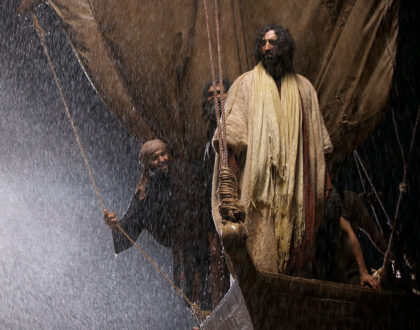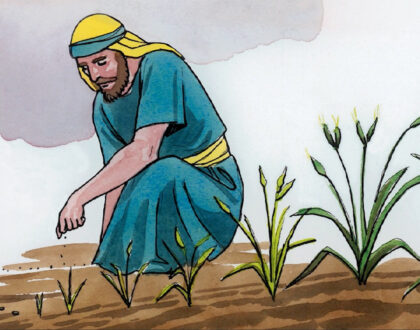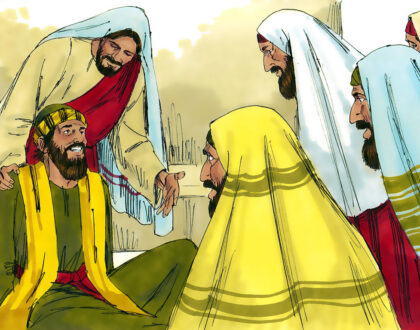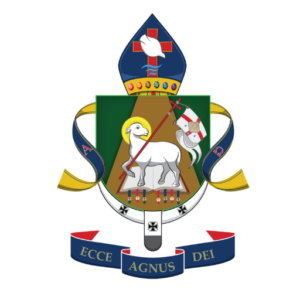The Church Builds and Restores
“The Church Builds and Restores”
Archbishop Loren Thomas Hines
Eighth Sunday in Ordinary Time
July 10, 2016
Readings: Deuteronomy 30:9-14, Psalm 25:3-9
Colossians 1:1-14
Luke 10:25-37
The story in today’s Gospel reading is very powerful, but I would remind you that before we could get to the gospel, we have to read the Old Testament in order to learn the principles that God had set from the very beginning. We aren’t separated from the past; the past is an integral part of our lives. There’s a continuity, a progression that we are all going through. All mankind is going through a journey.
In a family, there should be a progression, with the son growing up to become greater than his father. Sadly, we don’t see this today. In the Old Testament, God said His ways are not hard, but for many of us, obeying God is difficult and a big challenge. The Word of God is not far from us; it’s as close as our mouth and heart. “For this commandment which I command you today is not too difficult for you, nor is it out of reach. It is not in heaven that you should say, ‘Who will go up to heaven for us to get it for us and make us hear it, that we may observe it?’ Nor is it beyond the sea that you should say, ‘Who will cross the sea for us and get it for us and make us hear it?’ But the word is very near you, in your mouth and in your heart, that you may observe it.” (Deuteronomy 30:11-14). The whole principle of God is that close to us because of what God did. In creation, He made us in His image and likeness. We’re not lost if we understand what God has given us. The heart placed by God in man makes for unity, not division. The family of God is one with the Father.
Deuteronomy 30 assures us that God will prosper us abundantly if we obey His commandments. “The Lord your God will prosper you abundantly in all the work of your hand, in the offspring of your body, in the offspring of your cattle and in the produce of your ground….if you obey the Lord your God to keep His commandments and statutes….” (Verses 9-10). This is also shown in the New Testament. Romans 10:8 tells us that “The Word is near you, in your mouth and in your heart, that is, the word of faith which we are preaching If we are not prospering, the fault lies with us, not the economy nor the political situation. Abraham was very wealthy because of his obedience to God. It’s not our education, social standing and other such factors that determine the state we find ourselves in.
What do we speak – reality or the truth? We should know the truth; this truth is the Word of God. He tells us that “My people perish for lack of knowledge”. Without knowledge of the truth from His Word, our current reality becomes the truth for us. Christ gave us authority over everything around us. St. Paul understood the principles of God even better than the apostles did, even if he didn’t walk with Christ during His earthly ministry. The Colossian church in St. Paul’s time was taught by the apostles, and the Jews asserted that the Jewish traditions like circumcision should continue to be followed by the church. St. Paul, however, addressed them according to God’s truth and not according to reality: “We give thanks to God, the Father of our Lord Jesus Christ, praying always for you, since we heard of your faith in Christ Jesus and the love which you have for all the saints; because of the hope laid up for you in heaven, of which you previously heard in the word of truth, the gospel which has come to you, just as in all the world also it is bearing fruit and increasing…. (Colossians 1:3-5). In his letter to the Colossians, St. Paul laid down the foundation of the Church: faith, hope and love. We’ve all been given a measure of faith; this faith is in our hearts. Everything has been fulfilled by Christ. From the cross, He said, “It is finished!” He came to destroy the works of the devil. The lack and fault lie in us. If we believe that what Christ did is real, we’ll see things differently. St. Paul tells us that we’ve been given faith and hope, so now we can walk in love. Do we see this in our life? We were given hope in Christ. On the cross, He took away all our sins and bore our sickness and disease. This is our hope! Christ gave it to us. It is written and registered in heaven. Nothing can be more powerful than this.
St. Paul goes on to say, “….and he also informed us of your love in the Spirit” (Colossians 1:8). Do we see love in our lives today? This love is not the gooey stuff that the world proclaims as love. God is love and we were created in His image and likeness; therefore, we were created in the image of love. Most of us don’t understand this truth and this is why we don’t live in love. We’ve lost our identity. God created us to be like Him. Man failed at the fall, but Christ restored us to the image and likeness of God, which is love.
St. Paul also saw something that the others did not. When Christ went to heaven, He brought us with Him and seated us with Him and the Father, far above all rulers, powers and authorities. The truth will eventually overcome and trounce reality. St. Paul exhorts us to “walk in a manner worthy of the Lord, please Him in all respects, bearing fruit in every good work” (Colossians 1: 10). We are to please God in everything we do. We’ve been redeemed by a very high price. We’ve been given an inheritance, restored with the righteousness and holiness of Christ. Many times, we only see the reality of our failures and mistakes, but Christ didn’t come to judge us. He came to restore us. Restoration takes time. It’s a faster work to tear down then build a new one. But this isn’t what Christ did. He didn’t tear down and destroy; He came to restore. These are the days of Elijah and Ezekiel; the dry bones are coming together and being enfleshed. I believe this is already happening. The Church is beginning to come together. There’s now more of oneness and unity in the Church. Great things are happening.
The Gospel tells the story of a man travelling from Jerusalem to Jericho. Jerusalem is symbolic of holiness; Jericho is symbolic of sin. The man was leaving the righteousness of Jerusalem and this made him vulnerable to an attack by the enemy. He fell among robbers who stripped him and beat him up and left him half dead. A priest was going down the same road and saw him, but he didn’t stop to help. A Levite also came by and did the same thing; he passed by the other side, avoiding the injured man. A Samaritan came upon him and felt compassion for him, “bandaged up his wounds, pouring oil and wine on them; and he put him on his on beast, and brought him to an inn and took care of him” (Luke 10:34). The Samaritan had something which the two religious didn’t have – compassion. This story is a picture of humanity. Adam failed and man was beaten into a life of suffering. The Jews were brought to an even deeper bondage, having been given over 600 laws to obey. Then Christ came and He took the time to heal and restore us.
The story in today’s Gospel is the story of our salvation and restoration. Who is our neighbor? Christ is telling us today to be like the Samaritan. The Scriptures won’t help us until we act upon it by faith, in this case, by being compassionate to those who need our help. Our nature is love; it’s in our DNA. The Samaritan didn’t do something superficial like kiss the injured man or give him flowers. He took the time, made the effort and used his resources to heal the man. We should do the same, using the faith, hope and love we’ve been given to bring healing and restoration to others.
Deuteronomy 30 tells us that we will prosper abundantly if we obey God’s commandments. This prosperity means peace, and when peace is in our heart, our body will heal itself. Fear, on the other hand, hinders the healing. By His stripes, we are healed, because Christ came to destroy the works of the devil and these include bitterness and fear. Love builds, restores and lifts up. It helps those who can’t help themselves rise up. This is what Ordinary Time is all about. As God’s people, we’ve been given the responsibility to restore. Restoring people doesn’t always mean giving them everything or spoon feeding them. Sometimes we have to show people that they can get up again. To illustrate, Manny Pacquiao can give each of us a Ferrari, but we can ignore the expensive car and continue taking public transportation. We’ve been given so much by God and yet we don’t take them and use them. We must accept the forgiveness we’ve been given.
We have hope! The Kingdom of God belongs to us and it’s already bringing forth fruit, giving us strength and healing. God is always at work. He will never leave us nor forsake us. It doesn’t matter if the world hates us; God is on our side. Out of love, He redeemed us, despite the many times we have denied Him.
At the end of the Gospel, Jesus tells us to “Go and do the same” as the Samaritan did. This is the challenge for the Church. If the Church is not involved in restoration, it is not the Church. We are His glory. Let us restore and build. It will cost us, but we can never lose with God. He loves us!
Recent Sermons

Jesus, Calmer Of Storms
June 23, 2024

Harvest Time Stemming From The Smallest Seed
June 17, 2024

Not Bound By Limitations To Minister
June 10, 2024

